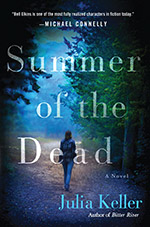 Julia Keller is quite simply a spectacular writer. Her Bell Elkins series, set in Acker’s Gap, West Virginia, has been deepening and improving with each installment. In this novel, Bell’s sister Shirley has returned from a long stint in prison, and the two are uncomfortably adjusting to living together. Bell is also dealing with a number of murders county wide, some of which seem related, some of which don’t. The atmosphere hanging over Acker’s Gap, like the summer heat, is oppressive and stifling.
Julia Keller is quite simply a spectacular writer. Her Bell Elkins series, set in Acker’s Gap, West Virginia, has been deepening and improving with each installment. In this novel, Bell’s sister Shirley has returned from a long stint in prison, and the two are uncomfortably adjusting to living together. Bell is also dealing with a number of murders county wide, some of which seem related, some of which don’t. The atmosphere hanging over Acker’s Gap, like the summer heat, is oppressive and stifling.
While this is a mystery novel with a solidly clever plot, Keller has other things on her mind as well. She portrays, all too heartbreakingly, various family situations (including Bell’s) that require hard work on the part of one family member in the service of another. Most vividly I think she portrays the situation of Lindy Crabtree, who works nights at the local gas station and whose father, a retired miner who may or may not have dementia, lives with her.
Keller utilizes her setting as an integral part of her story, Odell Crabtree being an illustration. Odell is Lindy’s father and he has worked so long in the mines that he is no longer comfortable standing up straight. Lindy has arranged the basement for him in as close an approximation to a mine – including rocks, tree branches and darkness – as she can, and it’s there that Odell seems to feel most at home. Below, her father lives in a mine; above, Lindy lives in the world of books, isolated except at work.
While Acker’s Gap is a small town, the various family situations portrayed by Keller are realistic in that the caretakers feel alone, a bit desperate, and locked in a pattern of caregiving. Ultimately the grief and care is borne alone by them, and included in this mix are Bell and her buddy, Sherriff Nick Fogelsong, whose mentally ill wife weighs on him just as Bell’s sister weighs on her.
Keller seems interested in what it means to let go; what it means to give freedom to a damaged person; and the necessity of asking for help. High minded concerns indeed. However, Keller shares with her spiritual sister Sharyn McCrumb something vital to a great mystery writer: a natural and compelling storytelling ability. Without the story, her use of setting, rich characterizations and thematic concerns would all would fall flat, in my opinion. Happily, Keller is the total package, and her continuing development as a writer is one I’m delighted to follow. Like McCrumb, I think she can be one of the genre’s greats.